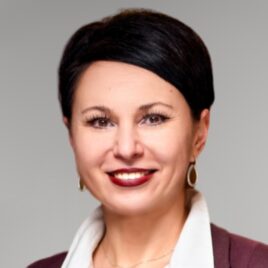August news digest
Contents
Corporate Law Practice
Updating information on the beneficial owners of a legal entity: The notification procedure will be effective as of 1 September
The Ministry of Justice of Ukraine reminds of the obligation of legal entities to have and submit information on the ultimate beneficial owner (UBO) or its absence, as well as the ownership structure, to the Unified State Register (USR) in accordance with Law No. 361 and Law No. 755.
Legal entities shall keep this information up to date. In case of discrepancies between the data on the UBO and the ownership structure, public authorities, law enforcement agencies, or primary financial monitoring entities (PFME) are obliged to notify the USR holder within 10 business days.
The notification procedure is defined by the order of the Ministry of Justice dated July 12, 2023, No. 2542/5, the implementation of which has been postponed until September 1, 2024. After the order comes into effect, a section for discrepancy notifications will be created on the official website of the Ministry of Justice.
Starting from October 1, the National Bank of Ukraine (NBU) will impose a monthly limit of 150,000 UAH for person-to-person card transfers for a period of six months
According to the Resolution of the Board of the National Bank of Ukraine dated August 27, 2024, No. 102, starting from October 1, 2024, the National Bank of Ukraine will temporarily impose a monthly limit of UAH 150,000 for person-to-person (P2P) and card-to-card (C2C) transfers for a period of six months.
The limit applies only to outgoing transfers from all accounts of a client opened in one bank to accounts of other individuals. The limit does not apply to accounts of volunteers who meet the criteria defined by the resolution and individuals whose monthly income from verified sources exceeds the established limit. It also does not apply to transfers between the client’s own accounts opened in one bank or to transfers of legal entities. Transactions using IBAN details are not restricted.
The imposed limit minimizes the use of payment infrastructure in illegal activities. According to the NBU, 98% of bank clients make monthly transfers that do not exceed the specified amount.
Businesses and citizens are exempt from guaranteeing the payment of customs duties when importing equipment for the restoration of energy capacities
On August 9, 2024, the Cabinet of Ministers adopted the resolution ‘On Amendments to the Resolution of the Cabinet of Ministers of Ukraine dated September 27, 2022, No. 1091.
The resolution supplements the list of goods for which no guarantee of payment of customs duties is required when imported into the customs territory of Ukraine and/or transited.
Primarily, this simplification applies to the import of power generation equipment, wind and solar generation equipment, and batteries (excluding low-capacity batteries), and will help citizens and businesses meet their energy needs during the restoration of the country’s energy capacities destroyed by the enemy.
The issue of registering vehicles imported as humanitarian aid has been regulated
On August 6, 2024, Resolution No. 895 was adopted, amending the resolutions of the Cabinet of Ministers of Ukraine dated September 7, 1998, No. 1388, and May 10, 2022, No. 584, which regulate the state accounting and registration of vehicles imported into the customs territory of Ukraine under a simplified procedure during martial law.
The resolution, in particular:
- Defines the declaration of the list of goods recognized as humanitarian aid as a document confirming ownership of the vehicle;
- Specifies the list of documents to be submitted for state registration or state accounting of vehicles recognized as humanitarian aid and imported into the customs territory of Ukraine under a simplified procedure;
- Provides for the possibility of issuing registration documents for trips abroad for vehicles recognized as humanitarian aid and imported into the customs territory of Ukraine under a simplified procedure, which are under temporary state accounting;
- Mandates the inclusion in the registration documents of a prohibition on the alienation of vehicles recognized as humanitarian aid and imported into the customs territory of Ukraine, in accordance with the requirements of the Law of October 22, 1999, No. 1192-XIV “On Humanitarian Aid”.
The government has allowed foreign companies to obtain permits for construction activities
On August 6, 2024, the government decided to allow foreign companies and organizations operating in Ukraine through representative offices and permanent establishments to obtain the right to conduct business activities related to the construction of facilities.
The relevant amendments are made to the Resolution of the Cabinet of Ministers of Ukraine dated March 18, 2022, No. 314. They pertain to the construction of facilities classified as medium (CC2) and significant (CC3) consequence classes.
The right to conduct construction activities will be granted by submitting a declaration of business activity to the licensing authority free of charge, without the need to obtain a construction license.
The adoption of this act will improve the regulatory framework for the activities of foreign companies in Ukraine. In particular, it will enable the representatives of Polish companies in Ukraine to carry out work on the arrangement of checkpoints on the Ukrainian-Polish border.
Businesses operating in affected communities are planned to be granted tax benefits and preferences
Businesses in de-occupied and frontline communities are planned to be granted tax benefits and low-interest loan rates. This is provided for in the draft framework law “On the Basic Principles of Restoration”.
This was announced during the third stage of public consultations on “Effective and Transparent Recovery Policy”, conducted jointly with the NGO “Institute Republic”.
The list of potential preferences includes:
- Infrastructure support – ensuring access to critical infrastructure (roads, electricity, water, internet, medical and educational services);
- Financial incentives (additional subsidies, grants, or preferential financing for the public and private sectors) or other forms of financial support for entrepreneurs who decide to start or expand their business in these areas;
- Tax benefits for entrepreneurs and individuals;
- Support for innovation and encouragement of investment;
- Promotion of local production and consumption;
- Informational support for entrepreneurship and training.
Tax Law Practice | Tax Alert
Agreement between Ukraine and the United Kingdom on the elimination of import duties and tariff quotas: ratification law has been adopted
On August 22, 2024, the Verkhovna Rada of Ukraine adopted the Law of Ukraine “On the Ratification of Agreement No. 3 in the Form of an Exchange of Letters between Ukraine and the United Kingdom of Great Britain and Northern Ireland on Amendments to the Agreement on Political Cooperation, Free Trade, and Strategic Partnership between Ukraine and the United Kingdom of Great Britain and Northern Ireland” (draft law No. 0268). The law is currently awaiting the signature of the President of Ukraine.
Under Agreement No. 3, the provisions eliminating import duties and tariff quotas in bilateral trade have been extended for most goods until March 31, 2029.
Exceptions include poultry and egg products, for which import duty rates will increase from April 1, 2026, to the levels stipulated in the schedule outlined in Annex I-A to the Agreement on Political Cooperation, Free Trade, and Strategic Partnership between Ukraine and the United Kingdom of Great Britain and Northern Ireland, and tariff quotas will apply (if these products fall under the tariff quota provided by this schedule).
Agreement No. 3 will enter into force after the parties complete the necessary internal procedures.
Procedure for approving minimum allowable export prices for certain types of goods enters into force
The Cabinet of Ministers of Ukraine, by Resolution No. 944 dated August 20, 2024, approved the procedure for determining minimum allowable export prices for certain agricultural goods subject to the export security regime (including natural honey, walnuts, certain grains, soybeans, rapeseed and sunflower seeds, soybean/sunflower/rapeseed oil, and meal) (hereinafter referred to as the “Procedure”). This Procedure came into force on September 3, 2024.
According to the Procedure, the Ministry of Agrarian Policy will determine these prices based on information from the State Customs Service, taking into account delivery conditions according to ”Incoterms”, and will ensure their approval by issuing an order by the 10th of each month.
The minimum allowable export prices for goods will be published on the official website of the Ministry of Agrarian Policy and will take effect the day after their publication.
Once the export security regime is implemented, the export of goods at prices lower than the minimum allowable export prices will be prohibited.
It should be noted that the Cabinet of Ministers of Ukraine has the right to decide on the implementation of the export security regime after all necessary regulatory acts are adopted (including this Procedure and the resolution on establishing criteria for unconditional registration of tax invoices/adjustment calculations for operations subject to the export security regime, the draft of which was published on August 1, 2024).
Overview of practice of the Supreme Court for July 2024 has been published
On August 20, 2024, a review of the case law of the Cassation Administrative Court within the Supreme Court for July 2024 was published.
Among other things, the review highlights a legal position expressed in the ruling dated July 25, 2024, in case No. 380/20490/21.
In this case, the courts established that the company, within the scope of its business activities, mixed automotive gasoline and additives to improve the quality of fuel.
The tax authority argued that such activity constitutes the production of new fuel. As a result, following a factual inspection, the tax authority issued a tax notice-decision imposing penalties for fuel production without the necessary license.
However, this decision of the tax authority was deemed unlawful and was annulled.
The Supreme Court clarified that the legislation requires obtaining a license for fuel production only in cases of processing crude oil, gas condensate, or natural gas. Mixing commercial gasoline, diesel fuel, and additives does not create a new product. Therefore, there is no obligation to obtain special permits (licenses) for such activities.
Litigation Practice
GOLAW once again successfully defended the interests of a green tariff electricity producer in the appellate court against SE “Guaranteed Buyer”
It should be noted that the Guaranteed Buyer did not fully settle payments with producers under the green tariff for the supplied electricity, citing Order No. 206 of the Ministry of Energy, which imposes restrictions on payments during martial law.
The GOLAW team successfully defended the rights of yet another producer in the appellate court. As a result, the court upheld the lower court’s decision, which obliges the Guaranteed Buyer to pay over 5 million hryvnias in favor of the producer.
The project was handled by the GOLAW litigation team: Partner and Head of Practice Kateryna Manoylenko, Senior Associate Anastasiia Klian, and Junior Associate Ilona Rudnyk.
The Cabinet of Ministers of Ukraine clarified requirements for summons for conscripts, reservists, and persons liable for military service
On August 27, the Cabinet of Ministers Resolution No. 951, “On Amendments to the Procedure for Conscription of Citizens for Military Service During Mobilization, for a Special Period”, came into effect.
The resolution clarified the requirements for the signing of summonses, specifically:
- Summonses issued on a blank must include the job title, first name, last name, signature of the official who issued the summons, and the date of signing. They must also be stamped with an official seal;
- Summonses generated through the Unified State Register of conscripts, reservists, and persons liable for military service (hereinafter referred to as the “Register”) must include the last name and first name of the head of the Territorial Center for Recruitment and Social Support (TCR) or its department, as well as the date of affixing the qualified electronic signature.
Additionally, it is stipulated that each summons generated through the Register must contain a unique electronic identifier in the form of a QR code. This code includes all the necessary details of the summons, as well as the registration number of the postal dispatch, in case the summons is sent via registered mail.
A summons generated through the Register may be printed. In such cases, the paper form must contain a QR code that is suitable for scanning and includes the corresponding information.
The Cabinet of Ministers of Ukraine amended the procedure for granting postponement from military service during mobilization
On August 21, the Cabinet of Ministers Resolution No. 930, “On Amendments to the Procedure for Conscription of Citizens for Military Service During Mobilization, for a Special Period”, came into effect.
The resolution revised the documents that confirm the right to a deferment from military service based on items 9, 13, and 14 of Part 1 of Article 23 of the Law of Ukraine “On Mobilization Preparation and Mobilization,” specifically for individuals liable for military service who:
- Are engaged in the constant care of a sick wife (husband), child, and/or their parents (or parents of the spouse) in cases established by law, who, according to the conclusion of the medical and social expert commission or the medical advisory commission of a healthcare institution, require constant care;
- Have one parent with a disability of Group I or II, or one parent of the spouse with a disability of Group I or II, provided that there are no other persons who are not liable for military service and are legally obliged to support them (except in cases established by law);
- Are members of the family of the second degree of kinship (or, in the absence of such persons, members of the family of the third degree of kinship) of a person with a disability of Group I or II and are engaged in their constant care (if the conditions established by law are met).
From now on, individuals liable for military service who care for a sick spouse, child, and/or their parents no longer need to include in their application to the Territorial Center for Recruitment and Social Support (TCR) information about the absence of other non-disabled family members, nor are they required to submit documents proving that other family members are unable to provide care. This information is only required from those who care for the sick parents of their spouse.
At the same time, individuals liable for military service who are engaged in the constant care of family members of the second degree of kinship who are persons with disabilities of Group I or II must indicate in their application to the TCR the absence of first-degree family members of the person they care for, while third-degree family members must indicate the lack of first- and second-degree family members of the person they care for.
Additionally, individuals liable for military service who have parents with a disability of Group I or II no longer need to establish the fact of providing care.
The Ministry of Digital Transformation amended the criteria for determining enterprises of critical importance to the economy in the field of digitalization
On August 22, the Ministry of Digital Transformation’s Order No. 123, which approved amendments to the Criteria for determining enterprises, institutions, and organizations of critical importance to the national economy in the field of digitalization, came into effect.
If it meets one or more criteria, an enterprise is determined to be critical to the economy in the field of digitalization.
Criminal Law Practice
The law on ratification of the Rome Statute of the International Criminal Court and amendments to it has been signed
The President of Ukraine signed a law on August 24, 2024, ratifying the Rome Statute. This law acknowledges Ukraine’s acceptance of the International Criminal Court’s jurisdiction over war crimes, crimes against humanity, and genocide since November 21, 2013. Additionally, Ukraine has recognized the jurisdiction of the ICC over the crime of aggression since July 17, 2018.
However, for seven years following the implementation of the Rome Statute in Ukraine, the country will not acknowledge the authority of the International Criminal Court in cases involving war crimes allegedly committed by Ukrainian citizens.
It is important to mention that the law discussed above shall come into force at the same time as the Law of Ukraine “On Amendments to the Criminal Code and the Code of Criminal Procedure of Ukraine regarding the ratification of the Rome Statute of the International Criminal Court and amendments to it.” Moreover, certain amendments to the Rome Statute will enter into force for Ukraine one year after the depositing of the instrument of ratification with the Secretary-General of the United Nations.
A person may be discharged from criminal liability for military offenses under certain conditions
On August 20, 2024, a law on amending Article 401 of the Criminal Code of Ukraine was passed by the Verkhovna Rada of Ukraine. According to this law, individuals who commit desertion or arbitrary abandonment of a military unit for the first time during martial law may be discharged from criminal liability. To be eligible, they must voluntarily submit a petition to the investigator, prosecutor, or court expressing their intention to return to the same or a different military unit or the place of service to resume military duties. Additionally, the commander or chief of the military unit or institution must provide written consent for the individual to continue their military service.
Thus, if the court closes criminal proceedings and discharges a suspect or accused person from criminal liability, the court shall, by its ruling, also oblige the discharged person to be immediately reinstated in military service after the entry into force of such ruling and to report to the relevant military unit or place of service to continue his/her military service within 72 hours.
The review of an expert opinion is not a procedural source of evidence as per the Supreme Court’s position
In case No. 708/1253/15-к, the defense, filing a cassation appeal, stated that the forensic expert report of May 22, 2009, had been carried out with significant deficiencies and provided the expert opinion of June 07, 2017, to support its arguments. In addition, the defense argued that this opinion established newly discovered circumstances, the existence of which leads to a review of the case.
The panel of judges from the Supreme Court dismissed the cassation in their resolution of August 8, 2024, pointing out that the specialists from the Bogomolets National Medical University only studied the forensic examination conducted on May 22, 2009. Therefore, the document titled “Conclusion of the Expert Study by Specialists in the Field of Forensic Medicine” dated June 7, 2017, is essentially a review of the expert’s conclusion from May 22, 2009, obtained during the criminal proceedings. It represents an assessment of the expert’s conclusion by other specialists in the field of forensic medicine, as stated by them.
Reviewing expert opinions is not a procedural action, and the document drawn up as a result has no evidentiary value. Within the meaning of the Criminal Procedure Law, such a review is not a means of challenging an expert opinion but a form of intra-agency control over its quality.
However, the examination of May 22, 2009, was conducted using materials that the forensic experts from the Bogomolets National Medical University did not have access to. Their conclusion, which is a review of the forensic expert’s conclusion, is not a procedural source of evidence under part 2 of Article 84 of the CPC. The specialists responsible for drafting it are not liable for their assessments of the expert’s opinion, its accuracy, validity, or any false claims made. Their personal opinion was expressed in a manner that did not allow the court to establish the facts and circumstances relevant to the criminal proceedings.
The court determined that the expert opinion given on June 7, 2017, cannot be considered as newly discovered evidence because it is based on facts that were already known to the parties involved in the criminal proceedings and were also investigated by the court.

Oleksandr Melnyk
Partner, Head of Corporate Law and M&A practice, Attorney at law
- Contacts
- 31/33 Kniaziv Ostrozkykh St, Zorianyi Business Center, Kyiv, Ukraine, 01010
- o.melnyk@golaw.ua
- +38 044 581 1220
- Recognitions
- Lexology Index: Client Choice 2026
- The Legal 500 2025
- IFLR1000 2025 (International Financial Law Review)
- Legal 500 Green Guide 2024
- 50 Leading Law Firms Ukraine 2026

Angelika Moiseeva
Partner, Attorney at law
- Contacts
- 31/33 Kniaziv Ostrozkykh St, Zorianyi Business Center, Kyiv, Ukraine, 01010
- a.moiseeva@golaw.ua
- +380 44 581 1220
- Recognitions
- The Legal 500 EMEA 2025
- Lexology Index: Business Crime Defence 2024

Viktoriia Bublichenko
Partner, Head of Tax, Restructuring, Claims and Recoveries practice, Attorney at law
- Contacts
- 31/33 Kniaziv Ostrozkykh St, Zorianyi Business Center, Kyiv, Ukraine, 01010
- v.bublichenko@golaw.ua
- +38 044 581 1220
- Recognitions
- ITR World Tax 2026
- Lexology Index: Corporate Tax 2025
- IFLR 1000 2024
- 50 Leading Law Firms Ukraine 2026

Igor Glushko
Partner, Head of Criminal Law and White Collar Defence practice, Attorney at law
- Contacts
- 31/33 Kniaziv Ostrozkykh St, Zorianyi Business Center, Kyiv, Ukraine, 01010
- i.glushko@golaw.ua
- +38 044 581 1220
- Recognitions
- The Legal 500 EMEA 2025
- 50 Leading Law Firms Ukraine 2026

Kristina Kolchynska
Counsel, Attorney at Law
- Contacts
- 31/33 Kniaziv Ostrozkykh St, Zorianyi Business Center, Kyiv, Ukraine, 01010
- k.kolchynska@golaw.ua
- +38 044 581 1220

Kateryna Tsvetkova
Partner, Litigation and Dispute Resolution practice, Attorney at law
- Contacts
- 31/33 Kniaziv Ostrozkykh St, Zorianyi Business Center, Kyiv, Ukraine, 01010
- k.tsvetkova@golaw.ua
- +38 044 581 1220
- Recognitions
- Lexology Index: Client Choice 2026
- Lexology Index: Employment & Labor 2025
- The Legal 500 EMEA 2025
- Lexology Index: Restructuring & Insolvency 2026
Sign up to be aware
New achievements are inspired by information. GO further, don’t miss out GOLAW news and legal alerts
Our expertise
-
- Energy and Natural Resources
- Antitrust and Competition
- Banking and Finance
- Compliance, Corporate Governance and Risk Management
- Corporate and M&A
- Criminal and White Collar Defence
- Defense in Anti-corruption procedures and regulations
- Labor and Employment
- Natural Resources and Environment
- Government Relations (GR)
- Insolvency and Corporate Recovery
- Intellectual property
- International trade
- Legal support of business and private Сlients in Germany
- Litigation and dispute resolution
- Private clients
- Real Estate and Construction
- Restructuring, Claims and Recoveries
- Martial Law
- Tax and Customs
- Digital Economy Practice
-
- Agribusiness
- Aviation
- Chemical industry
- Engineering, Construction and Building Materials
- Environment and Natural Resources
- Financial institutions
- IT and AI
- Industry and manufacturing
- Healthcare industries, Life sciences and Pharmaceuticals
- Media, Entertainment, Sports and Gambling
- Retail, FMCG and E-Commerce
- Transport and Logistics
We use cookies to improve performance of our website and your user experience.
Cookies policy
Cookies settings







